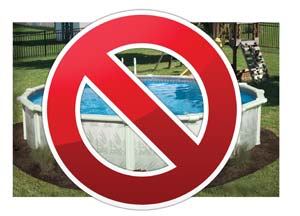Like most industries, the aboveground-pool market has suffered from the down economy and lack of consumer credit.
However, some aboveground-pool dealers are struggling with a more unique challenge.
“The problem we have is, a lot of the new neighborhoods they’re building don’t allow abovegrounds,” said Fran Struckhoff, co-owner of Prestige Pools and Spas in St. Louis.
Upscale developers often establish covenants to ensure that “unsightly” pools don’t tarnish the neighborhood’s look. Of course, these sub-divisions usually target a desirable demographic: new homeowners with discretionary income.
Many dealers and manufacturers think these bylaws are directed at big-box stores’ inflatable pools rather than higher-end aboveground models.
“[It’s hard] if you’ve got a willing buyer and they can’t get it done because of a law that wasn’t really meant to apply to what you’re selling. You don’t like to lose anything in this climate,” said Thor Iverson, owner of Swimming Pool Supply in Grimes, Iowa.
The covenants generally don’t make exceptions for aboveground pools installed into a slope or outfitted with a surrounding deck, he added.
“It’s really an unfortunate situation because all aboveground pools get thrown into the same pile,” noted Tommy Thomason, director of marketing at Splash Superpools in Little Rock, Ark. “They’re thinking of the $99 pool from Wal-Mart, which doesn’t even apply to us.”
But neighborhood ordinances aren’t the only roadblock to selling aboveground pools. Safety codes that now apply to soft-sided pools have put an added financial burden on homeowners looking for a more affordable product.
Additional calls for fences, gates and bonding requirements have helped spike the price of an otherwise budget-friendly product.
“Each community tries to add its own regulations, so it’s very difficult to put in an aboveground pool,” said a source who asked to remain anonymous. “All our dealers were off anywhere from 30- to 70 percent in sales.”
Still, some see a brighter future for aboveground pools as the economy recovers. The scarcity of credit may bring back consumers who had previously borrowed more to purchase a lower-end inground pool, according to Thomason.
“We’re looking for that part of the market to come back to us,” he said. “Since some portions of the economy are getting [better], people are going to be ready to turn loose of their money, but I think they’re going to be a little more frugal.”


